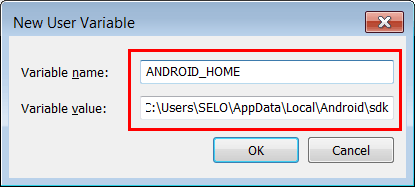

The App Center Build and Distribution service can automatically forward symbols to the Diagnostics service. If the missing symbols are uploaded, the unsymbolicated crash group will be replaced by a symbolicated crash group. The missing symbols from these crashes will be shown in the "unsymbolicated" tab. Unsymbolicated crashes are displayed in the App Center Diagnostics section so you can view some details even before uploading symbols. If you want to send Breakpad crashes from other platforms to App Center, see the upload custom crashes documentation.
#Install android ndk how to
To learn how to report NDK crashes, refer to the Android SDK documentation for Android apps, or Unity SDK documentation for Unity apps. To get the memory addresses translated for your Android NDK app, you must upload application symbols for each build. They don’t show class names, methods, file names, and line numbers which are needed to read and understand the crashes. The stack traces may only contain memory addresses. You can use the Google Breakpad client library for your Android apps to receive valid stack traces in native code. Start by setting up an environment for mobile development.Android NDK allows you to implement parts of your Android apps using C and C++. Set up an environment for cross-platform mobile developmentĬreate your first app that works both on Android and iOS with the IDE
#Install android ndk full
To learn about the full capabilities of the technology, check out other use cases. This tutorial describes how to share application logic between iOS and Android using Kotlin Multiplatform. Get to know Kotlin Multiplatform and create a mobile app that works on both Android and iOS by completing these steps: Try Compose Multiplatform, JetBrains' declarative UI framework based on Kotlin and Jetpack Compose to share UIs among iOS, Android, desktop, and web. See how different companies are already using Kotlin for cross-platform app development in production. It allows you to implement your user interface once and then use it for all the platforms you target – iOS, Android, desktop, and web.Ĭheck out our Kotlin Multiplatform Mobile Is in Beta video to learn about the current state and future plans for the technology.


#Install android ndk code
You can share application logic between iOS and Android apps and write platform-specific code only when you need to implement a native UI or work with platform APIs.Ĭompose Multiplatform, a JetBrains' declarative UI framework based on Kotlin and Jetpack Compose, gives you the option to push the sharing capabilities of Kotlin Multiplatform beyond application logic. One of the major Kotlin Multiplatform use cases is sharing code between mobile platforms. The Kotlin applications will work on different operating systems like iOS, Android, macOS, Windows, Linux, watchOS, and others. Kotlin Multiplatform technology simplifies the development of cross-platform projects. We'll do our best to minimize any changes you have to make. It is almost stable, but migration steps may be required in the future. Get started with Kotlin Multiplatform for mobile


 0 kommentar(er)
0 kommentar(er)
